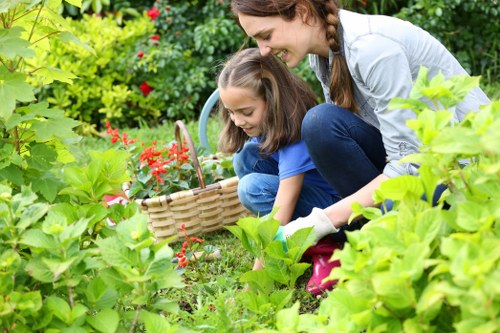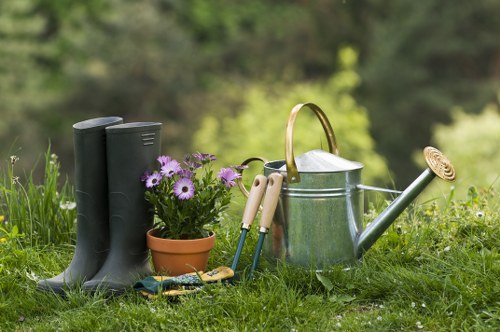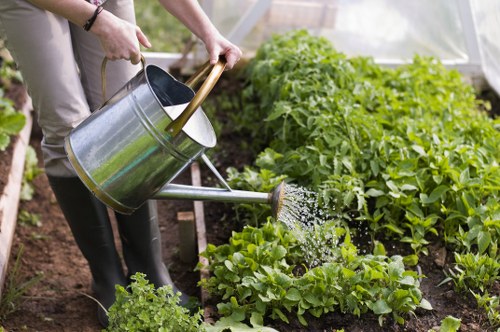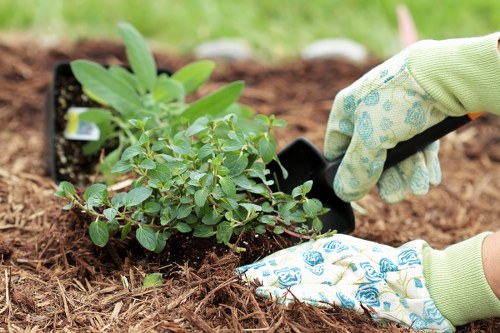Comprehensive Guide to Garden Maintenance in Chessington

Introduction to Garden Maintenance in Chessington
Maintaining a beautiful garden in Chessington requires a combination of **dedication**, proper planning, and the right techniques. Whether you're a seasoned gardener or a novice, understanding the specifics of garden maintenance in this unique locale can transform your outdoor space into a vibrant oasis.
Chessington's climate and soil conditions play a significant role in determining the best maintenance practices. By tailoring your approach to these factors, you can ensure your garden thrives all year round.
In this article, we'll explore essential garden maintenance tips, seasonal tasks, and professional services available in Chessington to help you keep your garden in top shape.

Seasonal Garden Maintenance
Spring Maintenance
Spring is the perfect time to prepare your garden for the growing season. Start by **cleaning up** any debris left over from winter. Prune dead branches, fertilize the soil, and plant early spring bulbs to add vibrant colors to your garden.
Regular watering is crucial during this time, especially as new plants begin to establish themselves. Consider installing a rain gauge to monitor rainfall and adjust your watering schedule accordingly.
Additionally, spring is an ideal time to assess any garden furniture or structures for repairs or replacements, ensuring your outdoor space is both functional and aesthetically pleasing.

Summer Maintenance
During the summer, focus on **watering** and **weeding**. The warmer temperatures can cause weeds to grow rapidly, so regular weeding is essential to maintain a tidy garden.
Implementing a drip irrigation system can help conserve water while ensuring your plants receive the necessary hydration. Mulching around plants also helps retain moisture and suppress weed growth.
Pruning is another critical task in the summer. Removing dead or overgrown branches not only promotes healthy growth but also enhances the overall appearance of your garden.

Autumn Maintenance
As the temperatures begin to drop, autumn is the time to prepare your garden for winter. Rake fallen leaves to prevent them from suffocating your plants and creating a breeding ground for pests.
Planting bulbs in the autumn ensures they have the necessary time to establish roots before the winter months. It's also an excellent time to divide and transplant perennials to encourage robust growth in the spring.
Protecting sensitive plants by adding mulch or using frost covers can help them withstand the colder temperatures, ensuring they remain healthy and vibrant.

Winter Maintenance
Winter garden maintenance focuses on protecting your garden from harsh weather conditions. Cover delicate plants and shrubs with frost cloths to prevent damage from freezing temperatures.
It's also a good time to perform **tool maintenance**. Clean and sharpen your gardening tools to ensure they're ready for the next planting season.
Planning and designing your garden layout for the upcoming year can help you make strategic decisions about plant placement and garden improvements, ensuring continued growth and beauty.
Essential Garden Tools for Chessington Maintenance
- Pruners: For trimming and shaping plants.
- Hoes: Essential for weeding and soil cultivation.
- Watering Systems: Drip irrigation or sprinklers to maintain optimal moisture levels.
- Garden Fork: Useful for aerating soil and removing pests.
- Mulching Tools: Helps in retaining soil moisture and suppressing weeds.
Investment in Quality Tools
Investing in high-quality garden tools can make maintenance tasks easier and more efficient. Quality tools are not only more durable but also provide better performance, reducing the physical strain associated with gardening.
Regularly maintaining your tools by cleaning and sharpening them ensures they remain effective and extend their lifespan, providing long-term benefits for your garden maintenance efforts.
Consider ergonomic designs that offer comfort and reduce fatigue, especially if you spend extended periods tending to your garden.
Professional Garden Maintenance Services in Chessington
If maintaining your garden becomes overwhelming, professional garden maintenance services in Chessington can provide expert assistance. These services offer a range of solutions tailored to meet your specific needs, ensuring your garden remains healthy and beautiful throughout the year.
Benefits of Hiring Professionals
- Expert Knowledge: Professionals have extensive experience and understand the local climate and soil conditions.
- Time-Saving: Hiring experts frees up your time to enjoy your garden without the stress of maintenance.
- Comprehensive Services: From planting and pruning to pest control and landscaping, professional services cover all aspects of garden maintenance.
- Customized Solutions: Tailored maintenance plans ensure your garden receives the care it needs to thrive.
Choosing the Right Service
When selecting a garden maintenance service in Chessington, consider factors such as experience, range of services, and customer reviews. A reputable service provider will offer personalized consultations to understand your garden's unique requirements and develop a maintenance plan that aligns with your goals.
Eco-Friendly Garden Maintenance Practices
Adopting eco-friendly garden maintenance practices not only benefits the environment but also promotes a healthier garden ecosystem. Here are some sustainable practices to incorporate:
- Composting: Recycling garden waste into compost enriches the soil and reduces landfill waste.
- Rainwater Harvesting: Collecting rainwater for irrigation conserves water and reduces utility bills.
- Native Plants: Planting native species supports local wildlife and requires less maintenance.
- Organic Pest Control: Using natural pest repellents minimizes chemical usage and protects beneficial insects.
- Mulching: Organic mulches improve soil health and retain moisture, reducing the need for frequent watering.
Benefits of Sustainable Practices
Implementing sustainable garden maintenance practices results in a resilient garden that can withstand environmental challenges. It also fosters a harmonious relationship between your garden and the surrounding ecosystem, promoting biodiversity and ecological balance.
Moreover, eco-friendly practices often lead to cost savings in the long run by reducing the need for chemical fertilizers and excessive watering.
Landscape Design and Maintenance
A well-designed landscape enhances the beauty and functionality of your garden. Incorporating elements such as pathways, seating areas, and water features can create inviting spaces for relaxation and entertainment.
Planning Your Landscape
Effective landscape planning involves assessing your garden's layout, soil quality, and sunlight exposure. Consider the following steps:
- Assessment: Evaluate the current state of your garden, identifying strengths and areas for improvement.
- Design: Create a layout that balances aesthetics with practicality, ensuring every element serves a purpose.
- Selection of Plants: Choose plants that complement each other and thrive in Chessington's climate.
- Implementation: Execute your design with careful planting, installation of structures, and placement of garden features.
- Maintenance: Regularly upkeep your landscape to preserve its beauty and functionality.
Incorporating Hardscaping Elements
Hardscaping elements like patios, decks, and fences add structure and define different areas within your garden. These features not only enhance the visual appeal but also provide practical benefits such as creating spaces for outdoor dining and increasing privacy.
Pest and Disease Management
Effective pest and disease management is crucial for maintaining a healthy garden. Early detection and sustainable control methods can prevent minor issues from escalating into significant problems.
Identifying Common Pests in Chessington
- Aphids: Small sap-sucking insects that can weaken plants.
- Slugs and Snails: Mollusks that feed on a variety of plants.
- Whiteflies: Tiny insects that target the undersides of leaves.
- Spider Mites: Microscopic pests that cause stippling on leaves.
Natural Pest Control Methods
Utilizing natural pest control methods helps maintain a balanced garden ecosystem. Consider introducing beneficial insects like ladybugs and lacewings, which prey on common garden pests. Additionally, using neem oil or insecticidal soaps can effectively manage pest populations without harming beneficial organisms.
Preventive Measures
Preventing pest infestations starts with maintaining garden health. Regularly inspecting plants, removing diseased foliage, and ensuring proper spacing can reduce the likelihood of pest problems. Crop rotation and companion planting are also effective strategies for minimizing pest issues.
Soil Health and Fertilization
Healthy soil is the foundation of a thriving garden. Proper soil maintenance and fertilization ensure that plants receive the necessary nutrients for optimal growth.
Soil Testing and Improvement
Conducting regular soil tests helps determine nutrient levels and pH balance. Based on the results, amend the soil with organic matter like compost or manure to enhance fertility and structure.
- Compost: Adds essential nutrients and improves soil texture.
- Manure: Provides a rich source of nitrogen for plant growth.
- Gypsum: Helps improve soil structure and drainage.
Choosing the Right Fertilizer
Selecting an appropriate fertilizer depends on your garden's specific needs. Organic fertilizers are a sustainable option that promotes long-term soil health, while synthetic fertilizers offer quick nutrient boosts. Balancing both can provide the benefits of immediate growth and sustained soil fertility.
Application Techniques
Proper fertilizer application is crucial to avoid nutrient runoff and plant damage. Follow the recommended dosage and application methods, whether it's side-dressing, foliar feeding, or incorporating fertilizers into the soil during planting.
Pruning and Trimming
Regular pruning and trimming are essential for maintaining the shape, health, and productivity of your plants. These practices encourage new growth, improve air circulation, and prevent disease.
Pruning Techniques
Different plants require specific pruning techniques. For example, fruit trees benefit from annual pruning to enhance fruit production, while flowering shrubs may need selective trimming to promote blooming.
- Heading Cuts: Shortening branches to encourage bushier growth.
- Thinning Cuts: Removing entire branches to open up the canopy.
- Deadheading: Removing spent flowers to extend blooming periods.
Tools for Pruning
Using the right tools makes pruning more efficient and reduces the risk of damaging plants. Invest in quality pruners, loppers, and saws to ensure clean cuts and ease of use.
Safety Precautions
Always prioritize safety when pruning. Wear protective gear, ensure tools are sharp and clean, and be mindful of your surroundings to prevent accidents.
Mulching for Garden Health
Mulching is a simple yet effective way to enhance garden health. It involves applying a layer of material on the soil surface to conserve moisture, regulate temperature, and suppress weeds.
Types of Mulch
- Organic Mulch: Includes materials like wood chips, straw, and compost that enrich the soil as they decompose.
- Inorganic Mulch: Comprises materials such as gravel, pebbles, and plastic sheeting that provide immediate weed suppression and moisture retention.
Benefits of Mulching
Mulching offers several advantages, including:
- **Moisture Conservation:** Reduces the need for frequent watering by retaining soil moisture.
- **Weed Control:** Suppresses weed growth, minimizing competition for nutrients.
- **Soil Temperature Regulation:** Keeps the soil cool in summer and warm in winter.
- **Erosion Prevention:** Protects soil from being washed away by heavy rains.
- **Enhanced Soil Health:** Organic mulches decompose to improve soil structure and fertility.
Application Tips
Apply mulch to a depth of 2-4 inches, ensuring it doesn't directly contact plant stems to prevent rot. Replenish mulch as needed, especially organic types that break down over time.
Watering Strategies for a Thriving Garden
Effective watering is crucial for maintaining a healthy garden. Understanding the specific water needs of your plants and implementing efficient watering strategies can lead to optimal growth and resource conservation.
Understanding Plant Water Needs
Different plants have varying water requirements. Native plants typically require less water, while ornamental flowers and vegetables may need more consistent moisture. Assess each plant's needs to tailor your watering schedule accordingly.
Efficient Watering Techniques
- Drip Irrigation: Delivers water directly to the plant roots, minimizing evaporation and runoff.
- Soaker Hoses: Allows for uniform water distribution along the length of the hose.
- Rain Barrels: Collects and stores rainwater for later use, promoting water conservation.
Watering Schedule
Water your garden early in the morning or late in the evening to reduce evaporation and allow plants to absorb moisture effectively. Adjust your schedule based on weather conditions and seasonal changes to ensure consistent hydration.
Signs of Overwatering and Underwatering
Recognize the signs of improper watering to take corrective measures promptly:
- Overwatering: Wilting despite wet soil, yellowing leaves, and root rot.
- Underwatering: Dry, brittle leaves, stunted growth, and soil pulling away from plant bases.
Conclusion
Maintaining a garden in Chessington involves a blend of **strategic planning**, consistent care, and adaptability to the local environment. By following the seasonal maintenance tips, utilizing the right tools, and considering professional services when needed, you can cultivate a thriving and beautiful garden.
Embracing eco-friendly practices further enhances your garden's sustainability and harmony with nature. Whether you're tending to a small urban garden or a sprawling backyard, these maintenance strategies will help you achieve a lush and vibrant outdoor space.
Contact us today to learn more about our garden maintenance services in Chessington and take the first step towards your dream garden.

